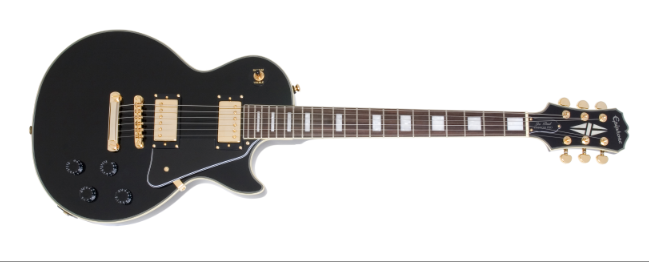Epiphone Les Paul Custom Pro review

I’ve always preferred the Les Paul Custom over the Standard for several reasons.
The main reason is the smooth playing action of its “fretless wonder” design, which is one of the reasons why shred-centric players like Al Di Meola, Randy Rhoads, Zakk Wylde, and many, many others gravitated towards that version of the Les Paul.
Another reason is that black finish and white finish Customs just look more “rock” than the Standard’s traditional goldtop and sunburst finishes. With the introduction of Epiphone’s Les Paul Custom Pro, there’s now another reason to consider the Custom: versatility.
Features
On the surface the Epiphone Les Paul Custom Pro looks identical to the traditional dual-humbucker Custom that was one of the few truly great American guitars of the late Sixties and Seventies.
It has a mahogany body, maple top, and glued-in set mahogany neck with a 24 3/4-inch scale, 22 medium jumbo frets, and large block inlays, and, like the Seventies versions, it’s available with either an Ebony or Alpine White finish and also in a left-handed version.
However, while it also features a pair of humbuckers with individual volume and tone controls as well as a three-position pickup selector switch, the pickups are an Epiphone ProBucker-2 at the neck and a ProBucker-3 at the bridge and the circuit is wired to provide coil splitting and out-of-phase tones in addition to humbucking sounds.
The volume controls have a push-pull function that engages coil splitting for the corresponding pickup, and the neck pickup tone control’s push-pull feature functions as a phase switch.
Get The Pick Newsletter
All the latest guitar news, interviews, lessons, reviews, deals and more, direct to your inbox!
Performance
If you’ve played a Les Paul Custom in the past and found its tone a little too dark and woofy, you should try the Epiphone Les Paul Custom Pro for a second opinion. Each of its humbuckers is individually voiced, with the bridge pickup providing throaty midrange thrust and the neck pickup delivering round body with crisp percussive attack, treble snap, and lively bass.
The split coil settings produce slightly thinner single-coil-style tones, but the output remains strong and punchy. The out-of-phase setting is most prominent when both pickups are engaged, producing a pronounced hollow midrange tone that is much more musically useful than the shrill treble usually produced by most phase switches.
The neck’s SlimTaper “D” profile is another notable upgrade. This is a very fast playing neck that, combined with the stellar fretwork, makes the Pro one of the most comfortable Customs I’ve ever played.
LIST PRICE: $948
MANUFACTURER: Epiphone, epiphone.com
CHEAT SHEET: Push-pull coil splitting for each pickup and a push-pull phase switch make the Les Paul Custom Pro much more sonically versatile than a traditional Custom.
The pickups are individually voiced and consist of a ProBucker-2 at the neck and a ProBucker-3 at the bridge.
THE BOTTOM LINE: The Epiphone Les Paul Custom Pro has the same beloved look of a classic Les Paul Custom, but upgrades like coil splitting, a phase switch, and the SlimTaper “D” neck profile make it more versatile and playable than ever.
Chris is the co-author of Eruption - Conversations with Eddie Van Halen. He is a 40-year music industry veteran who started at Boardwalk Entertainment (Joan Jett, Night Ranger) and Roland US before becoming a guitar journalist in 1991. He has interviewed more than 600 artists, written more than 1,400 product reviews and contributed to Jeff Beck’s Beck 01: Hot Rods and Rock & Roll and Eric Clapton’s Six String Stories.
“What blew me away was that everyone wanted the curly maple top. People were calling, saying, ‘I’ve got to have the bird inlays’”: Paul Reed Smith on raising the Standard 24, finally cracking the noise-free guitar and why John Sykes is a tone hero
“It combines unique aesthetics with modern playability and impressive tone, creating a Firebird unlike any I’ve had the pleasure of playing before”: Gibson Firebird Platypus review





![[from left] George Harrison with his Gretsch Country Gentleman, Norman Harris of Norman's Rare Guitars holds a gold-top Les Paul, John Fogerty with his legendary 1969 Rickenbacker](https://cdn.mos.cms.futurecdn.net/TuH3nuhn9etqjdn5sy4ntW.jpg)





